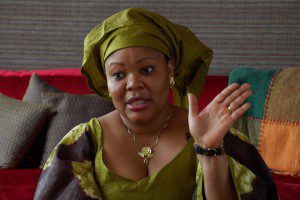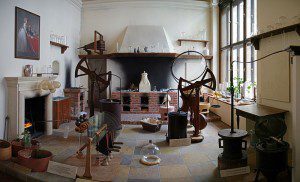 Leymah Gbowee, the 39-year-old Liberian peace activist, told NPR that she launched her movement in 2002 when a voice in a dream told her to “gather the women of the churches to pray for peace.” She shared this year’s Nobel Peace Prize with Liberia’s woman president, Ellen Johnson Sirleaf, and Yemeni democracy activist Tawakkul Karman.
Leymah Gbowee, the 39-year-old Liberian peace activist, told NPR that she launched her movement in 2002 when a voice in a dream told her to “gather the women of the churches to pray for peace.” She shared this year’s Nobel Peace Prize with Liberia’s woman president, Ellen Johnson Sirleaf, and Yemeni democracy activist Tawakkul Karman.
Gbowee’s movement, the Women of Liberia Mass Action for Peace, is widely known as the “women in white”. Its members have displayed remarkable courage as well as creativity in trying to end the brutality of Liberia’s long and savage civil war. The story of the women’s campaign is brought to the screen in a powerful documentary, Pray the Devil Back to Hell. It shows how Leymah and other women activists came together in the midst of a bloody civil war to take on the rival warlords and the corrupt regime of Charles Taylor. In 2003, as rebel forces closed in on the capital and peace talks stalled, the women of Liberia – Christian and Muslims united -put themselves in between the opposing forces, armed only with their white T-shirts, and successfully demanded an end to the fighting.
The women’s demonstrations eventually brought the exile of Charles Taylor and the election of Ellen Johnson Sirleaf, Africa’s first female head of state.
When the fighting was still raging, Leymah Gbowee led protesters through the streets, demanding the disarming of fighters accused of raping women and children. The women in white embarked on a “sex strike” . They agreed to deny sex to their partners unless they joined in the effort to end violence. Gbowee explained on NPR’s Tell Me More: “We didn’t have the power to go to peace talks, so we just thought, What else do we have to lose?’ “Our bodies are their battlefield. Let’s just put our bodies out there – we need to do something to change the situation if our children must live in this country.”
Gbowee found the courage to confront tyrants and hardened killers and call them to account. She recounts her own story in a memoir titled Mighty Be Our Powers: How Sisterhood, Prayer and Sex changed a Nation at War. She expresses the hope that women will find “a light to follow” in her example.
It is inspiring to know that, by her account, it all began with a big dream that infused her with the determination and the exact focus to manifest her cause. I am reminded of the saying of an early bishop of the church, Synesius of Cyrene, who declared that “through dreams, God may infuse us with his own courage.”

